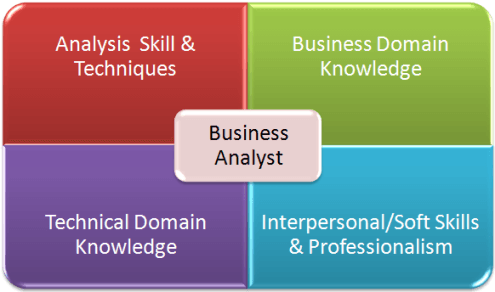I’ve always been of the opinion that I’d like to know as much as I can about whatever I can because you never know when something you learned may come in handy.
That said, I do think there are four key knowledge/capability domains that are especially important to the business analyst. I’ll provide a brief description of each domain and then provide short lists of possible self-check/development questions that you might find useful in determining whether you think you have adequate knowledge in a given domain given your current situation or even your career goals.

Business Analysis Skills & Techniques
The business analysis domain is, unsurprisingly, the most important skill/knowledge domain for a business analyst. It includes those skills and techniques typical of the business analyst (BA) job description, and that set the BA apart from other roles – typically project managers on one hand and designers or solutions architects on the other.
A business analyst with a solid foundation of BA domain knowledge will have inevitably accumulated some knowledge in the other domains as well, but expert knowledge in the business and technical domains isn’t necessary for an analyst to be effective.
The Business Analysis Body of Knowledge (BABOK) is a widely recognized and recommended resource for Business Analysis skills and techniques.
Personal Development Questions:
- How well do I understand the principles and techniques of requirements elicitation, analysis, specification, validation and management? How well do I perform them?
- How well am I able to distinguish between symptoms and true business problems?
- What is a business case, and why is it important to the work I do as an analyst? If asked to, could I help build a business case? Would I have the will to be honest and objective if the business case just isn’t there?
- How do I link product/project objectives to strategy?
- How well do I understand the various forms of requirements and when they should be used?
- How well am I able to model complex ideas that are more easily understood visually than verbally?
- How well do I know the various solution delivery methodologies including traditional and agile methods? How well do I understand the role of the analyst in each?
- How well do I understand the needs of other roles typical to solution delivery – Business stakeholders, IT management, project management, QA, Development, etc.?
- Do my requirements meet the needs of solutions delivery teams? If there is a lot of churn, and “analysis paralysis” how do I achieve an understanding with these teams?
- What is my knowledge of requirements management technology and the tools that are available to help define, store, and manage requirements?
Business Domain Knowledge
Business domain knowledge includes an understanding of the broader industry, competitive landscape, and even gets down into the specifics such as your particular client/company’s culture and business processes.
A significant part of an analyst’s stewardship consists of helping business stakeholders identify problems and define objectives. Business domain knowledge enables an analyst to be more efficient. While an analyst that is gifted in analysis skills and techniques might be able to do an adequate job without deep business domain knowledge, it’s reasonable to think that an analyst that does have a strong sense of business context should be able to more quickly determine the right questions to ask, and the right approach for handling business challenges.
Personal Development Questions:
- Who are the key players in the market?
- What are the common elements of the most successful players in the market?
- What trends or innovations may change, or are changing the competitive landscape?
- What position does the company hold in the market?
- What is the company’s strategy?
- What are the company’s mission? vision? values?
- What products does the company offer to the market? How are they received relative to competitive products? Why?
- How are the company’s products distributed?
- How does the company measure product success?
- What are the company’s organizational and functional strengths and weaknesses relative to its competitors?
- What specific systems or products will you be working with? How are they important to the company’s success?
- In what ways the the company’s culture conducive, or a barrier to product/project success?
- What are other barriers to successful product/project implementation?
- Who are the key, influential people in the company whose buy-in is critical to getting things done?
- What “sacred cows” or untouchable products/systems/programs does the company cling to?
Technical Knowledge/Aptitude
This domain ranges from a general understanding of how technology is used to solve business problems to detailed knowledge of specific systems or technologies.
The analyst role includes being able to make solution recommendations to the business – or at least to help in the decision making process. Knowledge of what the company’s technical assets and their capabilities and limitations can help the analyst be more efficient in this area. Technical knowledge is also useful in that it brings the analyst credibility with designers and developers and business stakeholders alike.
This seems to be the area where an analyst with deep knowledge is inclined to overstep the bounds of solution definition and amble into solution design, and there are varying opinions as to whether it is a good thing or not for an analyst to be an expert of things technical.
Personal Development Questions:
- What business problems does the company address through software and systems?
- What software and systems does the company use? What are those systems used for?
- What is my understanding of general technical architecture concepts? Of the company’s technical architecture in specific? What are the layers or tiers of architecture, and what is the importance of each?
- What technology does the company use to transfer information internally and externally?
- What is the history/evolution of the company’s technical architecture (systems and technologies used)
- What alternatives to those systems exist in the market?
- What are the relative strengths and weaknesses of the software and systems the company uses?
- How do users interact with the systems and software?
- What systems have I used extensively, or have a working knowledge of?
- What software development or querying languages and tools do I have a knowledge of? Which ones are used in the company?
- What are the primary sources of data in the company? What are the primary destinations of data in the company? What is my understanding of data models and the specific models and schemas the company uses?
- How are the various systems interdependent, or how do changes to one system typically impact other systems?
- What is the CIO’s (or the equivalent’s) information strategy, or what is the vision moving forward for using software and systems to meet business needs? What is the plan for getting there from where we are now?
Soft/Interpersonal Skills & Professionalism
Soft skills and interpersonal skills have more to do with the individual. Some are naturally gifted communicators or great with people and others are less so. Some may place these types of aptitudes under the business analysis domain and that’s ok, but I list them separately because I think they’re more generalized. Although they can be points of differentiation for a business analyst, they are not at all unique to the BA skill set. In fact, they’re required, to some degree, of most roles.
Again, you can be a passable business analyst without being a “people person” per se, but the skills in this area can be pretty obvious points of distinction between the passable and the expert.
Personal Development Questions:
- How well do I work with others? Operate in a team environment? Put the interests of the team first?
- How well do I facilitate meetings, workshops and reviews?
- How well do I prepare for and manage meetings in general?
- How is my general professional demeanor? Am I punctual? Do I dress appropriately to the business setting? Do I show professional courtesy in my dealings with others?
- Do I have the ability to lead others even if I don’t have a title that requires others to follow?
- How well am I able to broker mutual, win-win agreements between parties? Do I have a sense of when it’s appropriate compromise, and when it isn’t in order to achieve the most favorable outcome?
- How well do I communicate ideas in spoken and written form? How good a listener am I?
- How well do I establish and nurture relationships of trust with key business and solutions stakeholders?
- How well am I able to track down and find answers to questions that I don’t know the answers to myself?
- How well do I package and present ideas? How well am I able to tailor the message to the audience?
- How efficient am I with my time and courteous with regard to the time of others?
- Am I self-motivated, or do I require constant follow-up to make sure I am completing my work?
- How well do I accept constructive criticism?
Recap
So there are my thoughts on the four key domains of business analyst knowledge. I didn’t want to get into it in this post, but what’s interesting is that you’ll find that by assessing your mix of capabilities in these four areas, you can get some ideas as to what type of BA career might interest you and how/where you might want to specialize.
Would you have categorized the key areas of BA knowledge differently? What would you add or change? As always, I share my ideas on this in hopes of getting some good dialog and feedback.






@Jonathan; I’ve been reading your blog posts for a while and I will say that this post intrigues me because of the following reasons;
1. I’ve read posts by well-meaning business analysts saying that domain experience is irrelevant for business analysts.
The contention is that a good business analyst should be able to pick-up and run with any domain based on their analysis skills. In the end, these BAs asset that all you need is good analytic skills and that a BA with domain experience is less relevant because the domain expertise somehow biases them or makes them less open to improvements or better solutions.
Does domain knowledge make anyone less open to better solutions? I don’t think so. My opinion is more in-line with yours in the sense that, I will prefer to a hire a BA with domain expertise than one without (assuming that they’re equal in the other three (3) quadrants).
The employment market or hiring managers are folloing the domain expertise required path in a lot of job postings anyway.
I’m refreshed to read that your views are similar to those I’ve published.
What do you say?
Thanks
Kingsley,
I do think you can get by as a business analyst without much knowledge of a specific client’s business or technical domain if you have great BA skills.
The thing is, the way to get better as an analyst is to be an analyst, and to do… well… analysis. And that experience and improvement come over time – and over time you’re naturally going to acquire business and technical domain knowledge.
So, I think that the notion that you don’t necessarily have to have domain knowledge skills/knowledge really applies more for experienced/senior analysts who have been around enough other biz/tech environments to have developed relevant knowledge even if it isn’t a perfect match for the business or technology in use for a specific client.
And you’re absolutely right about the hiring practices. Companies certainly seem to see a need for experience in their industries and/or with their technologies if their job postings are any indication.
Again, a seasoned analyst with a wide variety of experiences and a proven track record may be able to skirt around some of those requirements.
I think I’ve said it before somewhere on my blog, but I’ll take any kind of business or technical domain knowledge I can get because – to your point – having it certainly won’t hurt your analysis skills, but you never know when it might come in handy.
Wow! I have been looking for a good way to communicate the facets of what I do and here it is, but even more than that you have aided me in questions to help extend my job knowledge by giving me checklist questions to help me become more valuable to the institute! Thank you
You’re welcome! I’m glad you found it helpful!
Very good article. I actually use somewhat similar classification of skill/knowledgw
types, just w/o the last one (incorporated into the BA part, I guess :-).
The only part that seems to create confusion though is using word “domain”
in all 4 areas since usually most BAs refer only to the business function/process
area.
Thanks for the feedback! I thought about incorporating the soft skills into the general BA area, but I’ve seen too many examples of analysts who had great analytical skills, but weren’t necessarily successful in the role because they lacked those soft, interpersonal skills. I know it is just a personal preference, but business analysis is such a social profession that I’ve always felt it worthwhile to address the soft skills separately.
My analytical skills are not that great but i think i have better soft skills..do you think business analyst would work for me ? I also have a business degree….the thing that worries me about the business analyst job is the analyst part.